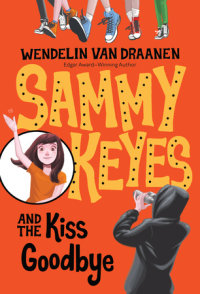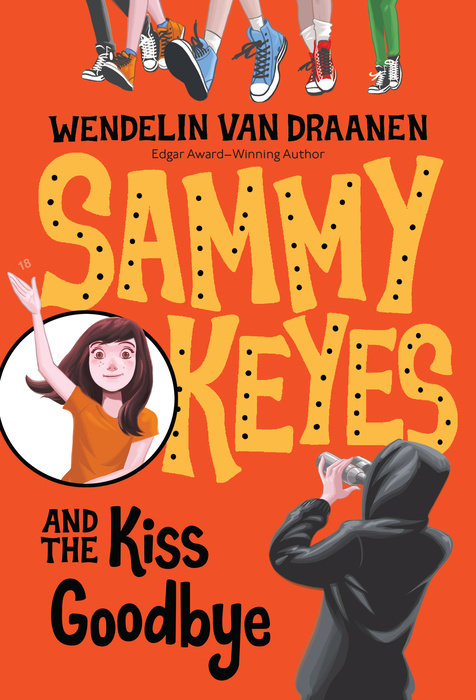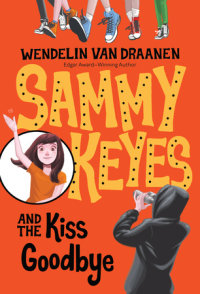Holly is the one who found her.
There was a lot of screaming.
And crying.
And as we all know, Holly is not a screamer. Or a crier. But afterward people said that her wails surely woke the dead.
Unfortunately, they did not wake Sammy Keyes.
Holly saw the whole thing--or, at least, parts of the whole thing--and when Sergeant Borsch found that out, he became relentless. (Or, as Sammy would have said, like a dog with a bone.)
“From the beginning,” he commanded Holly as he pulled her into a chair in the emergency room. “Every detail.”
Despite his tough-cop exterior, Sergeant Gilbert Borsch was, at the moment, a gun-slinging puddle of misery, his face etched deep with a single burning question:
Who did this?
(Well, there were other questions forming lines among those already present from years on the force--questions like Why? and When? and Where? and How? But the deepest, most painful crease was caused by the fiery rage of Who?)
Holly wasn’t focused on Sergeant Borsch or his topographic face. She stared instead at the door through which Sammy’s stretcher had…
Holly is the one who found her.
There was a lot of screaming.
And crying.
And as we all know, Holly is not a screamer. Or a crier. But afterward people said that her wails surely woke the dead.
Unfortunately, they did not wake Sammy Keyes.
Holly saw the whole thing--or, at least, parts of the whole thing--and when Sergeant Borsch found that out, he became relentless. (Or, as Sammy would have said, like a dog with a bone.)
“From the beginning,” he commanded Holly as he pulled her into a chair in the emergency room. “Every detail.”
Despite his tough-cop exterior, Sergeant Gilbert Borsch was, at the moment, a gun-slinging puddle of misery, his face etched deep with a single burning question:
Who did this?
(Well, there were other questions forming lines among those already present from years on the force--questions like Why? and When? and Where? and How? But the deepest, most painful crease was caused by the fiery rage of Who?)
Holly wasn’t focused on Sergeant Borsch or his topographic face. She stared instead at the door through which Sammy’s stretcher had been wheeled, and whimpered, “Is she going to be all right?”
Sergeant Borsch sucked on a tooth (an infamous habit cultivated before his doctor had suggested he quit with the pastrami and take up with turkey). Then he gruffed, “I’m not a doctor,” which was cop code for No, or Probably not, or Don’t get your hopes up--the latter being something Sergeant Borsch had learned was safer for his heart than optimism.
Or, regrettably, pastrami.
But suddenly Holly’s adoptive mother, Meg Talbrook, was blasting through the door, wrapping Holly in her arms as she panted out incoherent phrases and fragmented clauses and hopelessly dangling modifiers.
And since Meg was a dog groomer, which was just thiiiis far away from being a veterinarian, which (as everyone suspects but won’t actually say) is just thiiiis far away from being a doctor, and since there were, at that time, no doctors in attendance, Holly looked at her mother with desperate puppy-dog eyes and begged, “Tell me she’s going to be all right.”
The fragmented clauses suddenly ceased, Meg’s shoulders squared back, and her solid frame jelled into a protective barrier between her daughter and reality. Then she held her daughter’s face in her hands and lied with the unwavering conviction only a parent in crisis can muster. “She’s going to be fine.”
“It’s bad, Mom. There was a lot of blood. She wouldn’t wake up. She wouldn’t . . . she was just . . .”
“Who are we dealing with here, hmm?” Meg asked, sitting beside her. “Have you ever known anyone to get the better of Sammy?” She lifted Holly’s chin. “She was breathing, right? Her heart was beating, right?”
“I don’t know! They put a mask on her and stuck tubes in her and told me to stay back.”
Meg cast a wary eye on Sergeant Borsch, silently asking what he might know of the situation, but the best the Borschman could seem to do was, “She wasn’t under a white sheet. That’s all I know.”
“Don’t you have connections?” Meg whispered. “Can’t you find out?”
“They’ll come out when they know something,” the lawman stated. “That’s how this works. Me demanding information is gonna get us nothin’ but stonewalled. What I need to find out, ma’am, is who did this. That’s my job, and I really need your daughter’s cooperation.”
Meg turned to Holly, who looked down to collect her thoughts, but instead got caught up thinking about her shoes.
They were high-tops, just like Sammy’s.
It used to be just Sammy who wore high-tops, but now a lot of kids at William Rose Junior High did. Even (to the administration’s chagrin) some of the teachers. It was just one of those things. Something Sammy had started, not by trying, but by just standing up and being.
“Holly?” Sergeant Borsch rasped. “Holly, please.”
But instead of coming out with who, what, where, when, or why, what Holly said was, “She saved my life, you know. That time at the riverbed? When that creep was coming after me? She took him down with her umbrella.”
“That big black thing?” Meg asked. “You never told me that!”
“Please,” Sergeant Borsch said again, desperate for them to discuss the past in the future, not now, when he was trying to deal with the present.
Holly took a deep, choppy breath, held it for a moment, then said, “She was on her way home--”
“Home?” Sergeant Borsch asked. “But that makes no sense! This happened at the Highrise!”
As you’re probably aware, Sergeant Borsch is not known for his tact or his patience. And although he is a more tactful and patient man now than he was as a street-beat officer when Sammy first met him, these characteristics would need major work should he ever aspire to reach the rank of lieutenant. Or captain. Or (pray for the City of Santa Martina) chief.
So it came as no surprise to Holly that after just one short sentence Sergeant Borsch had already interrupted her, but Meg was not so accustomed to the lawman’s brusque ways. “The girls had been studying for exams,” she began.
“At the Pup Parlor?” Sergeant Borsch interjected, again interrupting after a single sentence.
“At our apartment above the business,” Meg said. “It was after nine and dark outside. I was heading off to take a shower before bed and told Sammy she should get home before her grandmother began to worry.”
“But her grandmother no longer lives in the Highrise!”
Sergeant Borsch’s confusion was understandable. Not so long ago Sammy had lived illegally with her grandmother on the fifth floor of Santa Martina’s only government-subsidized housing for seniors--the Senior Highrise (clearly named in a moment of unrivaled creative genius).
And although the secret of Sammy’s residence had never been openly discussed, the Borschman had figured it out and immediately wished he hadn’t. How could he let this girl continue to sneak up and down the fire escape and sleep on her grandmother’s couch when doing so was against the law?
It was the first time in his career that Officer Borsch had consciously looked the other way, convincing himself that there were bigger wrongs in this world than a kid sleeping on an old lady’s couch.


